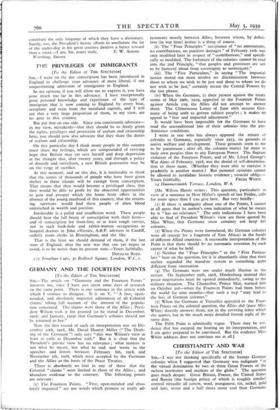THE PRIVILEGES OF IMMIGRANTS
[To the Editor of THE SPECTATOR]
write on the day conscription has been introduced in England to challenge your advocacy of most liberal, if not unquestioning admission of immigrants to England.
In my opinion, if you will allow me to express it, you have gone much too far in this advocacy. I have exceptionally great personal knowledge and experience of the type of immigrant that is now coming to England by every boat, aeroplane and train from the mainland capitals, and I will say that a very large proportion of them, in my view, are no gain to this country.
But put that on one side. Since you consistently advocate— in my view, mistakenly—that they should be so freely given the rights, privileges and protection of asylum and citizenship here, you should now also advocate that they share the duties of asylum and citizenship.
On this particular day I think many people in this country must share my feelings, which are compounded of reviving hope that Britain may yet save herself and deep depression at the thought that, after twenty years, and through a policy of dotardy and ostrichism, a new British generation may be on the verge of sacrifice.
At this moment, and on this day, it is intolerable to think that the scores of thousands of people who have been given shelter in these islands will be exempt from conscription. That means that they would become a privileged class, that they would be able to profit by the abnormal opportunities to gain and prosper which the home front offers in the absence of the young manhood of this country, that the return- ing survivors would find these people of alien blood entrenched in wealth and position.
Intolerable is a pallid and insufficient word. These people should bear the full brunt of conscription with their hosts— and of conscription for front-line, or at least rough service, not in such funk-hole and rabbit-warren occupations as hospital doctors in John o'Groats, A.R.P. advisers in Cardiff, orderly room clerks in Birmingham, and the like.
That is the least we should demand of them, if the last state of England, after the new war that one yet hopes to avoid, is to be worse than its present state.—Yours faithfully,
DOUGLAS REED.
c/o Jonathan Cape, 30 Bedford Square, London, W.C. r.














































 Previous page
Previous page